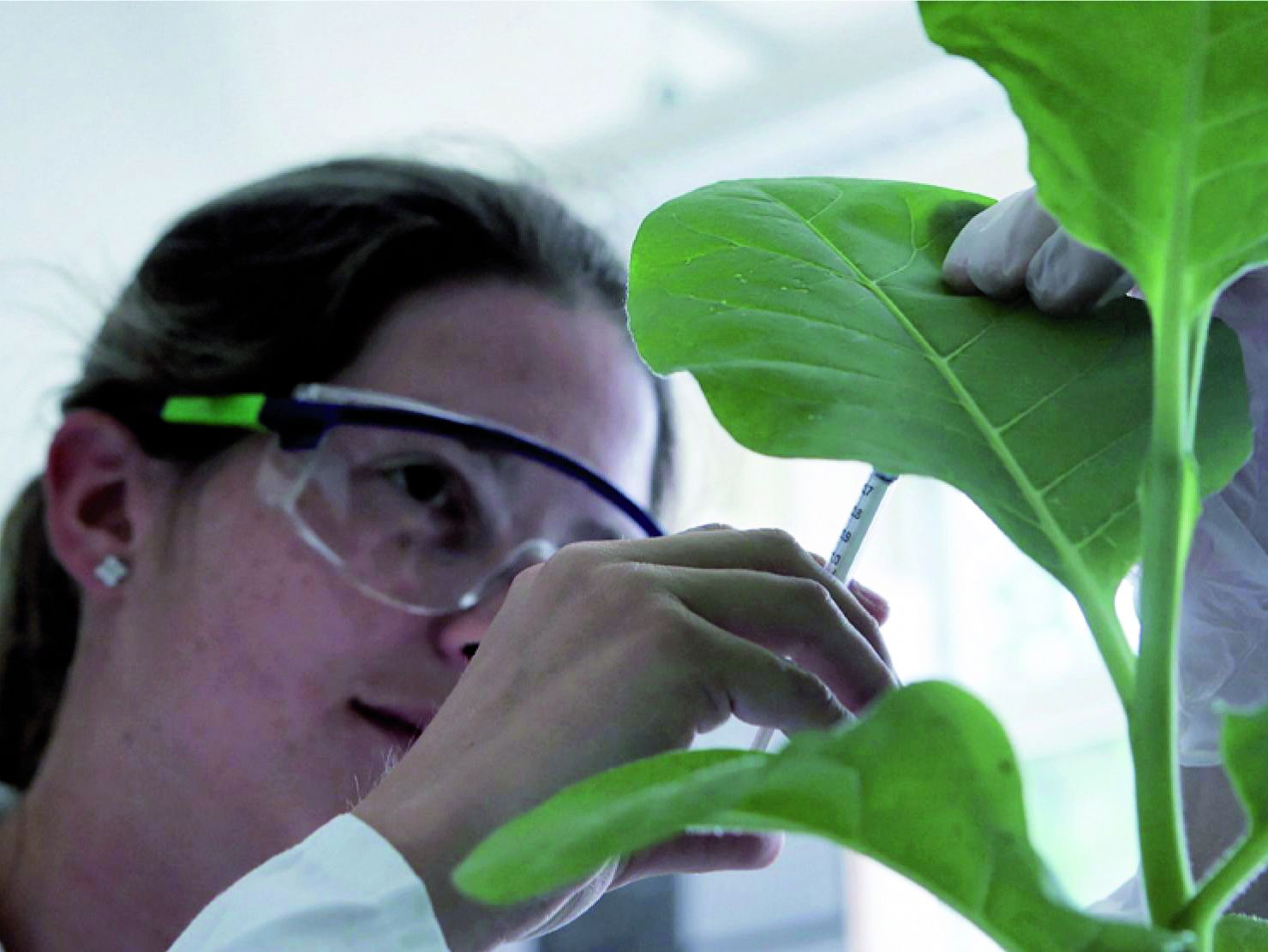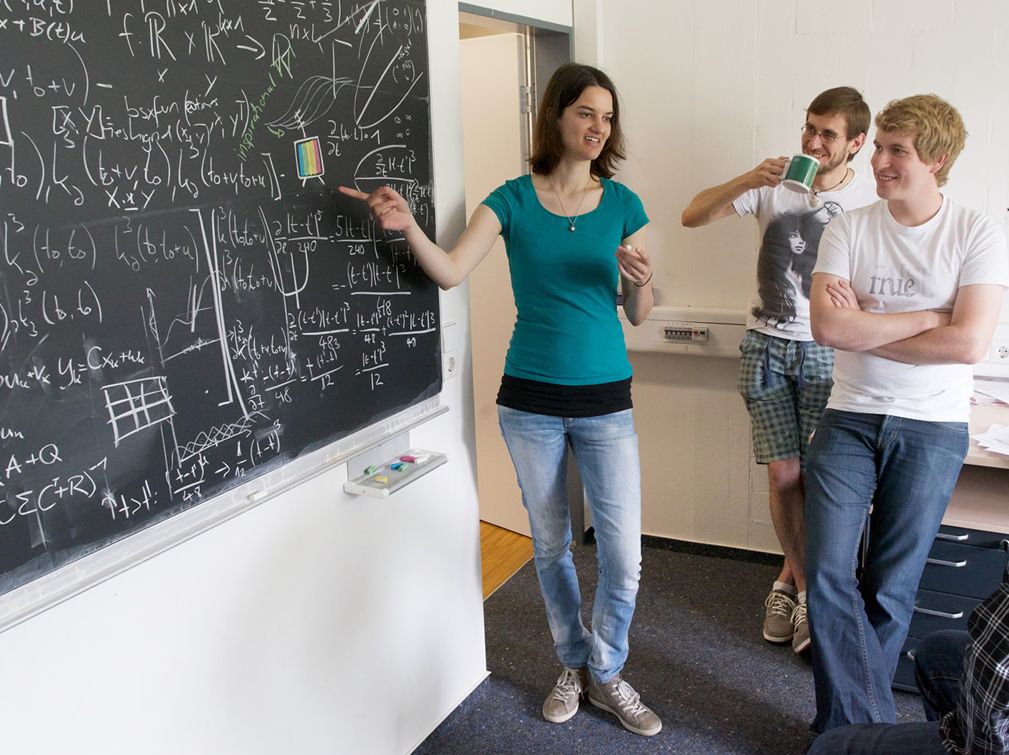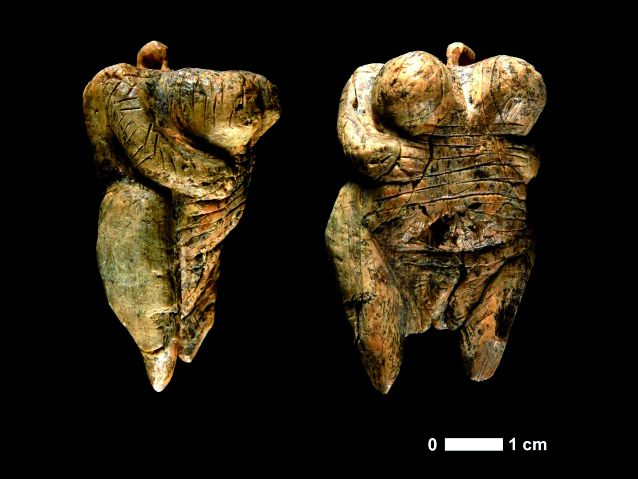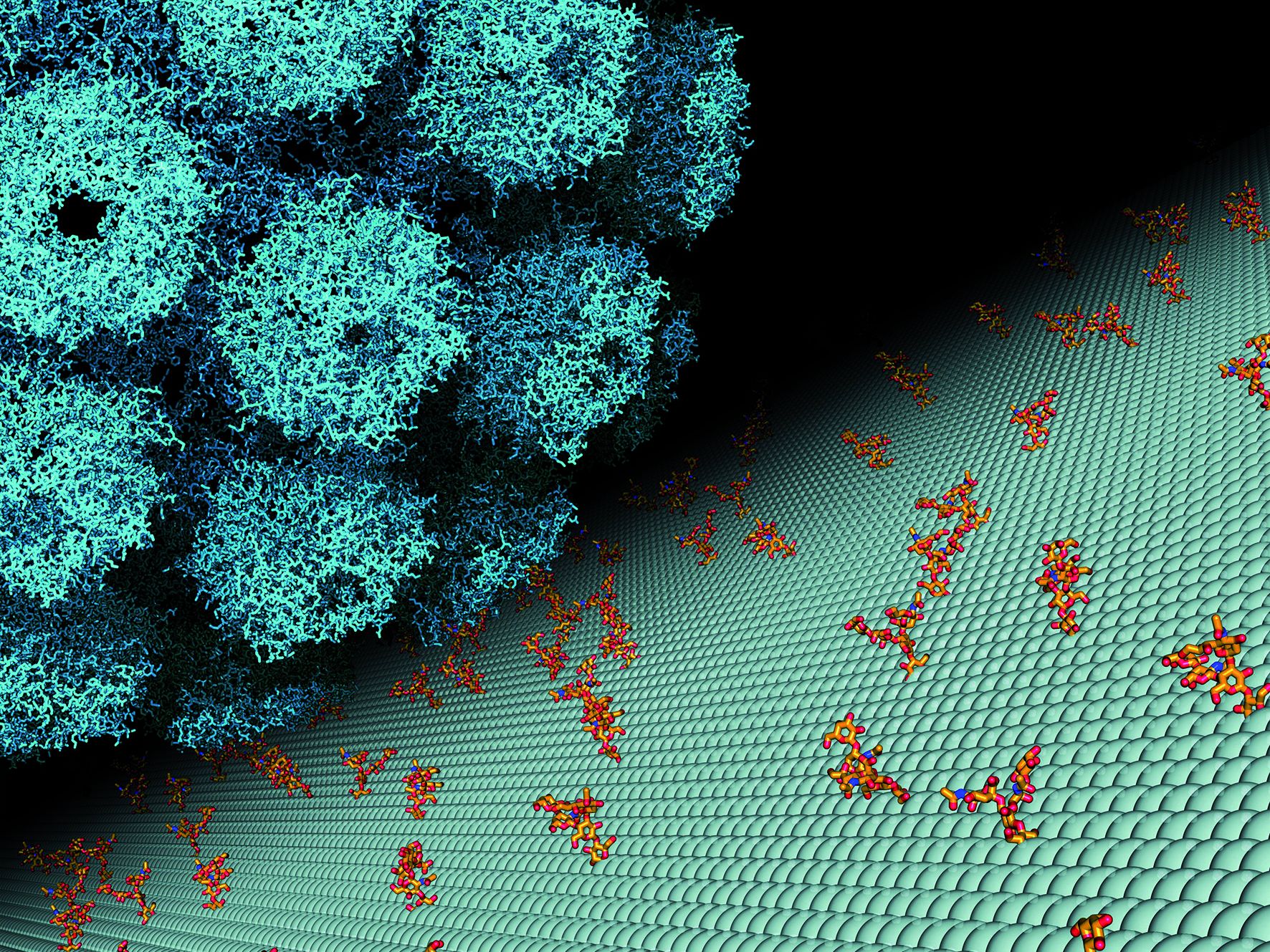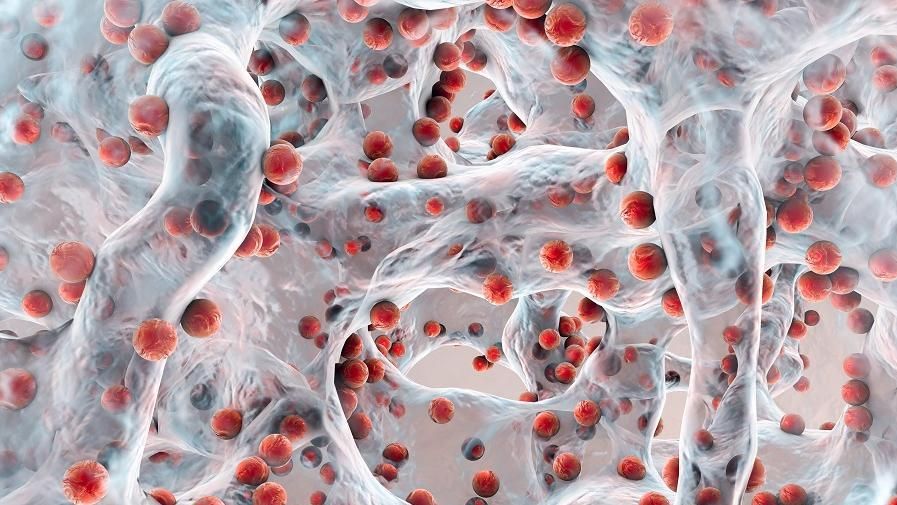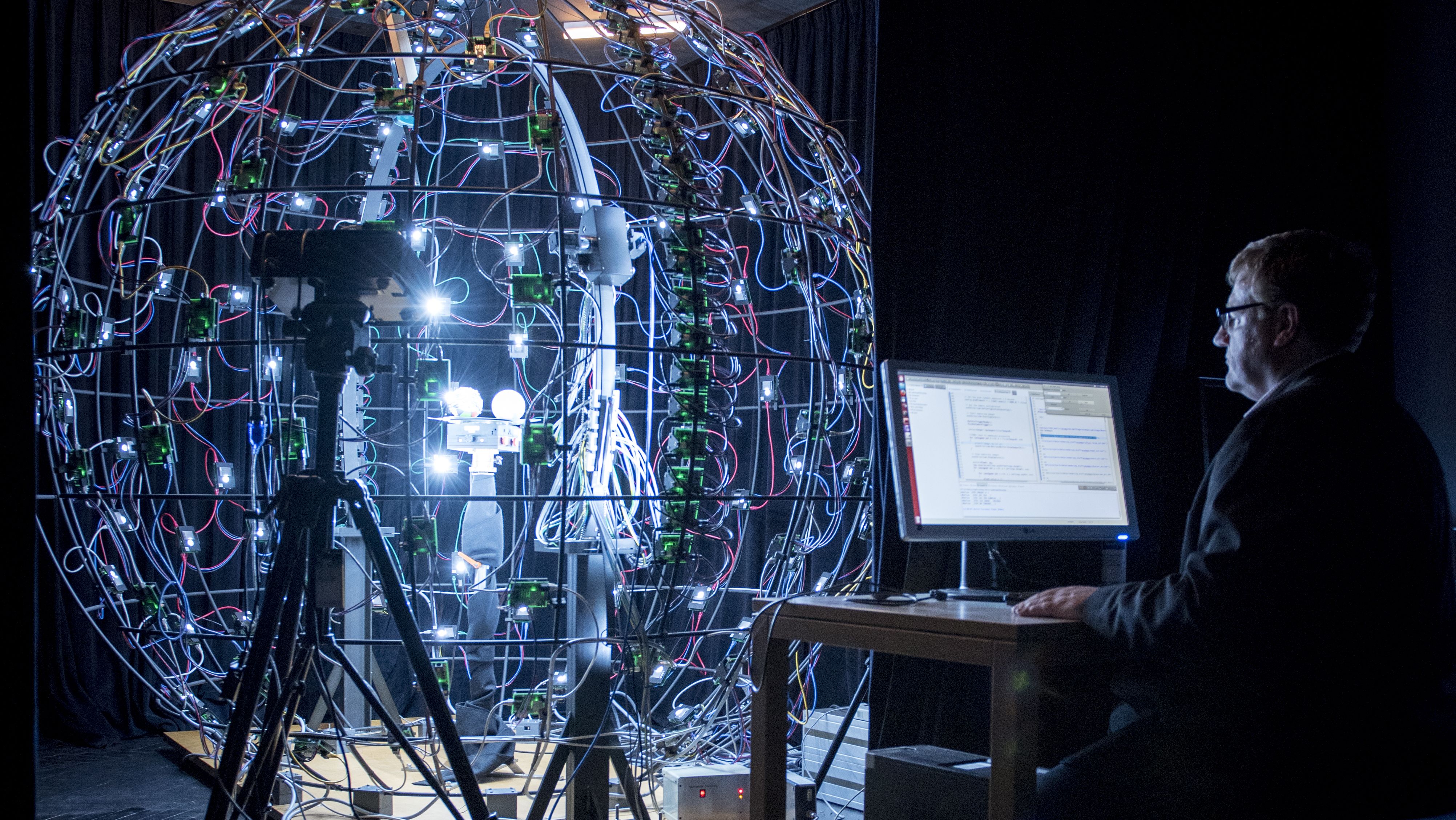With its research profile, the Faculty of Mathematics and Natural Sciences at the University of Tübingen plays a leading role in the field of life sciences and natural sciences research in Germany. With its participation in three clusters of excellence and numerous large collaborative projects, the research activities of our faculty are interdisciplinary and thematically broad-based. The above-average research strength is also reflected in a large number of publications and third-party funding. Research is characterised by close cooperation within the Tübingen Research Campus, with other universities and non-university research institutions in the region and internationally.
Collaborative Research Centers
Spokesperson function in the Faculty of Science
- 2014 - 2025 SFB 1101 "Molecular Encoding of Specificity in Plant Processes“
- 2017 - 2024 SFB 1233 "Robust Vision“
Principal Investigator in the Faculty of Science
- 2024 - 2027 SFB 1629 "Negation in Language and Beyond"
- 2023 - 2026 SFB 1573 "4f for Future"
- 2016 - 2027 SFB 1177 "Molecular and Functional Characterization of Selective Autophagy"
- 2015 - 2027 SFB 1173 "Wave Phenomena: Analysis and Numerics"
- 2013 - 2025 SFB 1089 "Synaptic Micronetworks in Health and Disease"
- 2013 - 2025 SFB 1070 "RessourceCultures"
Transregional Collaborative Research Centers
Spokesperson function in the Faculty of Science
- 2023 - 2026 TRR 356 "PlantMicrobe"
- 2023 - 2026 TRR 352 "Mathematics of Many-Body Quantum Systems and Their Collective Phenomena"
- 2019 - 2024 TRR 261 "Cellular Mechanisms of Antibiotic Action and Production"
Principal Investigator in the Faculty of Science
Research Units
- 2023 - 2027 Prof. Dr. Tobias Lachenmaier: FOR 5519 "Precision Neutrino Physics in JUNO"
- 2022 - 2026 Prof. Dr. Igor Lesanovsky: FOR 5413 "Long-range interacting quantum spin systems out of equilibrium: Experiment, theory and mathematics"
- 2020 - 2026 Prof. Dr. Barbara Kaup: FOR 2718 "Modal and amodal cognition: Functions and interactions"
- 2019 - 2024 Prof. Dr. Karl Forchhammer: FOR 2816 "The Autotrophy-Heterotrophy Switch in Cyanobacteria: Coherent Decision-Making at Multiple Regulatory Layers"
Research Training Groups
Spokesperson function in the Faculty of Science
- 2020 - 2028 Prof. Dr. Robert Feil: GRK 2381 "cGMP: From Bedside to Bench“
- 2018 - 2027 Prof. Dr. Doron Rapaport: GRK 2364 "The multifaceted functions and dynamics of the mitochondrial outer membrane"
with project management in the Faculty of Science
- 2017 - 2026 Prof. Dr. Mandy Hütter and Prof. Dr. Rolf Ulrich: GRK 2277 "Statistical Modeling in Psychology” (SMiP)"
Interdisciplinary Research
Interfaculty Institutes and Centres
-
Bernstein-Zentrum für Computerbasierte Neurowissenschaften Tübingen (BCCN)
-
Carl Friedrich von Weizsäcker-Stiftungsprofessur für Theorie und Geschichte der Wissenschaften
-
Comprehensive Infectious Disease Center Tübingen (CIDiC)
-
Deutsches Konsortium für Translationale Krebsforschung (DKTK)
-
Interfakultäres Institut für Biomedizinische Informatik (IBMI)
-
Interfakultäres Institut für Mikrobiologie und Infektionsmedizin Tübingen (IMIT)
-
Internationales Zentrum für Ethik in den Wissenschaften (IZEW)
-
Interfakultäres Zentrum für Pharmakogenomik und Arzneimittelforschung (IZEPHA)
-
Kompetenzzentrum für Archeometrie – Baden-Wuerttemberg (CCA-BW)
-
Proteomzentrum Tübingen (PCT)
-
Südwestdeutsches Tumorzentrum Tübingen-Stuttgart (CCC)
-
Werner Reichardt Centrum für Integrative Neurowissenschaften (CIN)
Non-University Research Institutions cooperating with the Faculty of Science
- Cyber Valley
- Deutsches Krebsforschungszentrum (DKFZ)
- Deutsches Zentrum für Diabetesforschung e. V.
- Deutsches Zentrum für Infektionsforschung (CIDRE)
- Deutsches Zentrum für Neurodegenerative Erkrankungen (DZNE)
- Friedrich-Miescher-Laboratorium der Max-Planck-Gesellschaft Tübingen
- Hertie-Institut für klinische Hirnforschung (HIH)
- Informations-, Kommunikations- und Medienzentrum (IKM)
- Leibniz-Institut für Wissensmedien (IWM)
- Max-Planck-Institut für biologische Kybernetik Tübingen
- Max-Planck-Institut für Entwicklungsbiologie Tübingen
- Max-Planck-Institut für Intelligente Systeme Tübingen
- Naturwissenschaftliches und Medizinisches Institut Reutlingen (NMI)
- Next Generation Sequencing Competence Center Tübingen
- Robert-Bosch-Institut für Klinische Pharmakologie Stuttgart
- Senckenberg Center for Human Evolution and Palaeoenvironment (SHEP)
Honours (selection)
Leibniz Prizes
The Gottfried Wilhelm Leibniz Prize, with prize money of up to 2.5 million euros, is Germany’s most important research prize. It is awarded annually by the German Research Foundation (DFG).
-
2023 Prof. Dr. Largus T. Angenent, Geosciences
-
2021 Prof. Dr. Katerina Harvati-Papatheodorou, Palaeoanthropology
-
2018 Prof. Dr. Bernhard Schölkopf – Machine Learning
-
2008 Honorarprof. Dr. Elisa Izaurralde – Biochemistry
-
2007 Prof. Dr. Detlef Weigel – Plant developmental biology
-
2001 Prof. Dr. Hans Keppler – Mineralogy
-
1999 Prof. Dr. Volker Mosbrugger – Palaeontology
-
1998 Prof. Dr. Wolf Bernd Frommer – Molecular Plant Physiology
-
1995 Prof. Dr. Gerd Jürgens – Molecular Plant Development
-
1992 Prof. Dr. Hans-Georg Rammensee – Immunology
-
1986 Prof. Dr. Christiane Nüsslein-Volhard – Developmental Biology
-
1986 Prof. Dr. Herbert Jäckle – Biology
Humboldt Professorships
Alexander von Humboldt Professorships bring top international researchers to German universities. The Humboldt Professorship is the most valuable international research prize awarded in Germany.
- 2020 Prof. Dr. Peter Dayan – Computational Neuroscience
- 2017 Prof. Dr. Largus T. Angenent – Environmental Biotechnology
- 2015 Prof. Dr. Marja Timmermans – Pattern formation and cell differentiation during organogenesis
ERC-Grants
The European Research Council (ERC) was founded by the European Commission to sponsor basic research. It provides funding to outstanding researchers conducting pioneering work in their fields.
Advanced Grant:
- 2022 - 2027 Prof. Dr. Katerina Harvati-Papatheodorou (Geosciences): Our First Steps to Europe: Pleistocene Homo sapiens Dispersals, Adaptations and Interactions in South-East Europe (FIRSTSTEPS)
Consolidator Grants:
- 2024-2029 Prof. Dr. Philipp Hennig (Computer Science): Advanced Numerics for Uncertainty and Bayesian Inference in Science (ANUBIS)
- 2023 – 2028 Prof. Dr. Jakob Macke (Computer Science): Using Deep Learning to Understand Computations in Neural Circuits with Connectome-constrained Mechanistic Models (DeepCoMechTome)
- 2023 – 2027 Prof. Dr. Georg Martius (Computer Science): Model-based Reinforcement Learning for Versatile Robots in the Real World (REAL-RL)
- 2022 – 2027 Prof. Dr. Rosa Lozano Durán (Center for Plant Molecular Biology): Emerging Multifactorial Complexity at the Geminivirus-host Interface (GemOmics)
- 2021 – 2026 Dr. Sireen El Zaatari (Geosciences): Tracing Hominin Occupations of and Migrations through the Levant: Reviving Paleolithic Research in Lebanon (REVIVE)
- 2019 – 2024 Prof. Dr. Eric Kemen (Center for Plant Molecular Biology): Knowledge based Design of Complex Synthetic Microbial Communities for Plant Protection (DeCoCt)
Starting Grants
- 2024 – 2028 Dr. Maria Spyrou (Geosciences): Infectious Disease Outbreaks as Contributors to Socio-cultural Transformations in the 2nd Millenium BCE (PROTOPEST)
- 2022 – 2026 Prof. Dr. Michael Filarsky (Interfaculty Institute of Biochemistry): Uncovering the Mechanisms Behind Adaptive Gene Expression Switching in Malaria Parasites (MALSWITCH)
- 2021 – 2025 Dr. Christoph Ratzke (Interfaculty Institute of Microbiology and Infection Medicine): Bugs as Drugs: Understanding Microbial Interaction Networks to Prevent and Treat Infections (BugDrug)
- 2021 – 2026 Dr. Suayb Üstün (Center for Plant Molecular Biology): Utilizing Diversity to Decipher the Role of Autophagy in Plant-Microbe Interactions (DIVERSIPHAGY)
- 2020 – 2025 Prof. Dr. Andreas Geiger (Computer Science): Learning Generative 3D Scene Models for Training and Validating Intelligent Systems (LEGO-3D)
- 2019 – 2024 Prof. Dr. Marcus Scheele (Chemistry): Coupled Organic Inorganic Nanostructures for Fast, Light-Induced Data Processing (COINFLIP)
- 2019 - 2024 Prof. Dr. Marcello Porta (Mathematical Physics): Macroscopic Behavior of Many-Body Quantum Systems (MaMBoQ)
Emmy Noether Junior Research Groups
- 2024 - 2030 Dr. Margot Smit: Arrested Development - How do plants control fate transition timing?
- 2024 - 2030 Kyle Mason Jones: The devil in the details: Phage microhabitats as drivers of soil biogeochemistry
- 2022 - 2028 Dr. Florian Wimmers: Systems Biology Analysis of Vaccine-induced Immunitiy to Infectious Diseases in Cancer Patients
- 2021- 2027 Prof. Dr Robert Bamler: Resource-Efficient Bayesian Machine Learning
- 2020 - 2026 Dr. Matthias May: Structure-Potential Relashionships of Electrochemical Interfaces by in situ Reflection Anisotropy Spectroscopy
- 2019 - 2025 Prof. Dr. Lisa Maier: Modulating the Gut Microbiome Composition with Drugs
- 2018-2024 Dr. Daniela Doneva: Gravitational Waves from Compact Objects
- 2018-2024 Prof. Dr. Reinhard Drews: Quantifying ice-ocean interactions with geophysical oberservations and modelling
- 2018 - 2024 Prof. Dr. Gerard Pons-Moll: Real Virtual Humans
Core Facilities
Center LISA+
The research and service facility LISA+ is one of the five Core Facilities within the infrastructure of the University of Tübingen. LISA+was founded in 2011 and originates from the intensive cooperation of several research groups for physics, chemistry, geosciences, biology and medical materials science, who are sharing the existing multi disciplinary Nanostructure and Analysis Laboratory.
The facility is centered around the Nanostructure Laboratory, which provides a large variety of techniques and methods, including both, standard methods for sample fabrication & characterization, as well as advanced unique research tools.
The concept of LISA+ is to coordinate the human resources, technical facilities and research topics for:
- efficient and professional use of present resources,
- coherent planning of sustainable development,
- expert training and advice,
- optimizing knowledge transfer between users within LISA+ and external partners, incuding industry.
Contact
Instrument Scientists:
Dr. Ronny Löffler
Dr. Markus Turad
info@lisaplus.uni-tuebingen.de
+49 7071 29-76260
Tübingen Structural Microscopy Core Facility (TSM)
As one of the five Core Facilities within the infrastructure of the University of Tübingen, Tübingen Structural Microscopy (TSM) coordinates the existing resources in (cryo) electron microscopy of the Departments of Biology and Earth Sciences and the Center for Plant Molecular Biology (ZMBP) at the Campus Morgenstelle. The TSM expands the already existing Network Electron Microscopy Tübingen, which was founded in 2007 as an informal association of 15 working groups.
The TSM brings together scientists from the geosciences, life sciences and materials sciences and support them in their research by providing methodological advice and training. This offer includes support starting with sample preparation, through instrument operation and imaging, to image interpretation and analysis. In addition, special courses are offered for the methodological training of young academics.
Contact
Funded by the Federal Ministry of Education and Research (BMBF) and the Baden-Württemberg Ministry of Science as part of the Excellence Strategy of the German Federal and State Governments
Quantitative Biology Center
External content
Actually, you are supposed to see a video here. To display this content (source: www.xyz.de), please click the "Accept" button below. Please note that by viewing the video, data might be transmitted to third parties or cookies may be stored.
For further information see our privacy policy.
Dear prospective collaborator,
Welcome to QBiC’s website!
The Quantitative Biology Center (QBiC) is in operation since 2012 as the central unit for bioinformatics and omics technologies of the University of Tübingen, its Medical Faculty and the Max Planck Institute for Developmental Biology. Through partnering with ten on-campus core facilities, we offer services on the full range of omics technologies. The data generation is complemented by integrated bioinformatics analyses, and all high-throughput data is managed centrally. QBiC’s unique privacy-preserving data management concept adheres strictly to the FAIR guidelines and is used as the data management infrastructure for all QBiC projects.
Please take the opportunity to browse our website and get in touch with us to learn more about our services.
We would be pleased to support you in your on-going or upcoming data-driven research projects.
With kind regards,
Dr. Sven Nahnsen
QBiC Director
Funding
Funding for QBiC is provided by DFG (core facilities program) and the University of Tübingen.
QBiC Portal
Visit our qPortal!
Contact
Quantitative Biology Center (QBiC)
M3 Research Center
University of Tübingen
Ottfried-Müller-Straße 37
72076 Tübingen
+49 7071-29-82530

